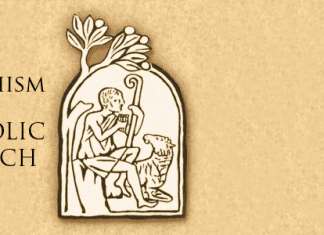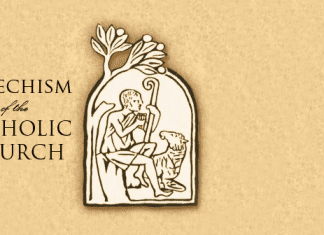Catechism of The Catholic Church #160
160 To be human, "man's response to God by faith must be free, and... therefore nobody is to be forced to embrace the faith against his will. the act of faith is of its very nature a free act." "God calls men to serve him in spirit and in truth. Consequently they are bound to him in conscience, but not coerced. . . This fact received its fullest manifestation in Christ Jesus." Indeed, Christ invited people to faith and conversion, but never coerced them. "For he bore witness to the truth but refused to use force to impose it on those who spoke against it. His kingdom... grows by the love with which Christ, lifted up on the cross, draws men to himself."
Catechism of The Catholic Church #271
271 God's almighty power is in no way arbitrary: "In God, power, essence, will, intellect, wisdom, and justice are all identical. Nothing therefore can be in God's power which could not be in his just will or his wise intellect.”
Catechism of The Catholic Church #717
717 "There was a man sent from God, whose name was John." John was "filled with the Holy Spirit even from his mother's womb" by Christ himself, whom the Virgin Mary had just conceived by the Holy Spirit. Mary's visitation to Elizabeth thus became a visit from God to his people.
Catechism of The Catholic Church #1127
1127 Celebrated worthily in faith, the sacraments confer the grace that they signify. They are efficacious because in them Christ himself is at work: it is he who baptizes, he who acts in his sacraments in order to communicate the grace that each sacrament signifies. the Father always hears the prayer of his Son's Church which, in the epiclesis of each sacrament, expresses her faith in the power of the Spirit. As fire transforms into itself everything it touches, so the Holy Spirit transforms into the divine life whatever is subjected to his power.
Catechism of The Catholic Church #1050
1050 When we have spread on earth the fruits of our nature and our enterprise . . . according to the command of the Lord and in his Spirit, we will find them once again, cleansed this time from the stain of sin, illuminated and transfigured, when Christ presents to his Father an eternal and universal kingdom." God will then be "all in all" in eternal life: True and subsistent life consists in this: the Father, through the Son and in the Holy Spirit, pouring out his heavenly gifts on all things without exception. Thanks to his mercy, we too, men that we are, have received the inalienable promise of eternal life.
Catechism of The Catholic Church #756
756 "Often, too, the Church is called the building of God. the Lord compared himself to the stone which the builders rejected, but which was made into the comer-stone. On this foundation the Church is built by the apostles and from it the Church receives solidity and unity. This edifice has many names to describe it: the house of God in which his family dwells; the household of God in the Spirit; the dwelling-place of God among men; and, especially, the holy temple. This temple, symbolized in places of worship built out of stone, is praised by the Fathers and, not without reason, is compared in the liturgy to the Holy City, the New Jerusalem. As living stones we here on earth are built into it. It is this holy city that is seen by John as it comes down out of heaven from God when the world is made anew, prepared like a bride adorned for her husband.
Catechism of The Catholic Church #689
689 The One whom the Father has sent into our hearts, the Spirit of his Son, is truly God. Consubstantial with the Father and the Son, the Spirit is inseparable from them, in both the inner life of the Trinity and his gift of love for the world. In adoring the Holy Trinity, life-giving, consubstantial, and indivisible, the Church's faith also professes the distinction of persons. When the Father sends his Word, he always sends his Breath. In their joint mission, the Son and the Holy Spirit are distinct but inseparable. To be sure, it is Christ who is seen, the visible image of the invisible God, but it is the Spirit who reveals him.
Catechism of The Catholic Church #2310
2310 Public authorities, in this case, have the right and duty to impose on citizens the obligations necessary for national defense. Those who are sworn to serve their country in the armed forces are servants of the security and freedom of nations. If they carry out their duty honorably, they truly contribute to the common good of the nation and the maintenance of peace.
Catechism of The Catholic Church #1702
1702 The divine image is present in every man. It shines forth in the communion of persons, in the likeness of the union of the divine persons among themselves.
Catechism of The Catholic Church #80
80 "Sacred Tradition and Sacred Scripture, then, are bound closely together, and communicate one with the other. For both of them, flowing out from the same divine well-spring, come together in some fashion to form one thing, and move towards the same goal." Each of them makes present and fruitful in the Church the mystery of Christ, who promised to remain with his own "always, to the close of the age".















